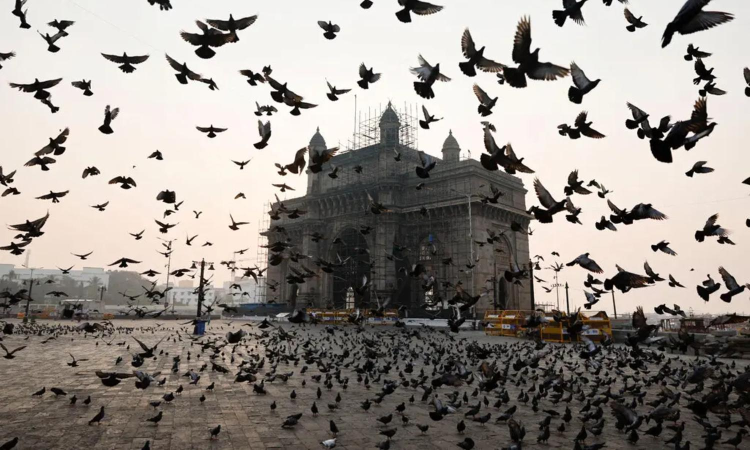Religious objections: Mumbai’s pigeon-feeding rules aren’t going over well
But in Mumbai, recent restrictions on pigeon feeding have generated protests, counter-protests, clashes with police, and threats of hunger strikes. The tensions highlight cultural and religious fault lines in India’s largest city.

Pigeons are often seen as an unavoidable feature of the urban landscape, and bans on feeding them around the world, from Trafalgar Square in London to St. Mark’s Square in Venice, have been enacted without much public pushback.
But in Mumbai, recent restrictions on pigeon feeding have generated protests, counter-protests, clashes with police, and threats of hunger strikes. The tensions highlight cultural and religious fault lines in India’s largest city.
It all started last month, when Maharashtra politicians raised concerns about the risks pigeons pose to human health. The state government directed officials in Mumbai, the state capital, to close dozens of feeding spots for pigeons, known as kabutarkhanas in Hindi.
The crackdown has upset animal lovers and some leaders of the city’s Jain community, a small but influential religious group that tends to align with the BJP. Some Jains have protested, arguing that curbing pigeon feeding infringes on their religious practice of showing compassion to all living creatures.
The central principle of Jainism is a commitment to nonviolence against and compassion toward all creatures, down to the smallest insect. Some Jain monks wear masks to avoid breathing in organisms or carry a broom to sweep away insects as they walk.
In Jain sacred texts, “feeding living beings is part of the religious scripture — serve the voiceless — and bird feeding is part of that exercise,” said Dhiraj Baldia, an animal welfare expert in Mumbai from the Jain International Seva Organization, which was also involved in the first protest. He cited the story of the Shantinatha, one of the religion’s supreme teachers, who is said to have saved a deity disguised as a pigeon by offering his own flesh in return.
This month, the BJP has sought to cast itself as a mediator between the Jain community and municipal officials. Mangal Prabhat Lodha, Maharashtra’s minister of employment and a BJP politician, urged Mumbai’s governing civic body to “find a balanced and humane solution — one that ensures public health and safety while also safeguarding the lives and well-being of birds.”
Tension over pigeon feeding grew in recent years as the pigeon population surged because of an abundance of food and a decline of predators like falcons, and as health officials began voicing concerns about potential risks for humans, said Kishor Rithe, director of the Bombay Natural History Society, a conservation organization.
GC Khilnani, a pulmonologist in New Delhi, said that pigeon droppings and feathers can cause fungal infections. Long-term exposure can cause interstitial lung disease, which scars lung tissue and can become fatal if left untreated, he said.
Beyond the Jain community, the ban on pigeon feeding has upset other residents for whom the practice is a religious or cultural tradition, said Ronojoy Sen, a political scientist who has written about religion in India.
In “The Big-Hearted Will Take the Bride,” a beloved 1995 Bollywood film about an Indian couple falling in love while backpacking through Europe, the main character feeds pigeons at home and in Trafalgar Square. The London scene evokes the idea that feeding pigeons is intimately tied to Indian culture, Sen said.
“You have this Indian man feeding pigeons in Trafalgar Square, almost as if he’s brought a piece of India with him,” he said.
@The New York Times



